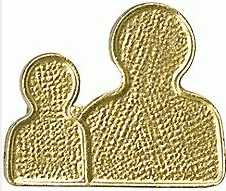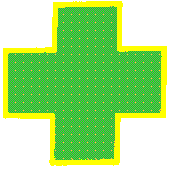Webelos Scout Activity Badges
|
CITIZEN(*), COMMUNICATOR, FAMILY MEMBER, READYMAN(**)
* Required for Webelos Badge
** Required for Arrow of Light

CITIZEN
Required for
Webelos Badge
Arrow of Light
Do this
- With your parent, guardian, or Webelos den leader, complete
the Citizenship Character Connection.
- Know: List some of your rights as a citizen of the United States of America. Tell ways you can show respect for the rights of others.
- Commit: Name some ways a boy your age can be a good citizen. Tell how you plan to be a good citizen and how you plan to influence others to be good citizens.
- Practice: Choose one of the requirements for this activity badge that helps you be a good citizen. Complete the requirement and tell why completing it helped you be a good citizen.
Do all of these:
1.Know the names of the President and Vice-President of the United States, elected. Know the names of theGovernor of your state and the head of your local government.2.Describe the flag of the United States and give a short history of it. With another Webelos Scout helping you, show how to hoist and lower the flag, how to hang it horizontally and vertically on a wall, and how to fold it. Tell how to retire a worn or tattered flag properly.3. Explain why you should respect your country's flag. Tell some of the special days weyou shouldfly it. Tell when to salute the flag and show how to do it.4.Repeat the Pledge of Allegiance from memory. Explain its meaning in your own words.Lead your Webelos den in reciting the pledge.5.Tell how our National Anthem was written.6.Explain the rights and duties of a citizen of the United States. Explain what a citizen should do to save our natural resources.7. Alone or with your Webelos den, do a special Good Turn. Help your church or other religious organization, school, neighborhood, or town. Tell what you did.As a Webelos Scout, earn the Cub Scout Academics belt loop for Citizenship At a Webelos den meeting, talk about the service project Good Turn that you did.
And do two of these:
8.Tell about two things you can do that will help law enforcement agencies.9. VisitWith your Webelos den or your family, visit a community leader. Learn about the duties of the job or office and tell. Tell the members of your Webelos denwhat you have learned.10.Write a short story of not less than 50 words about a former U.S. president or some other great Americanman or woman. Give a report on this to your Webelos den.11.Tell about another boy you think is a good citizen. Tell what he does that makes you think he is a good citizen.12.List the names of three people you think are good citizens. (They can be from any country.) Tell why you chose each of them.13.Tell why we have laws. Tell why you think it is important to obey the law. Tell about three laws you obeyed this week.14. Tell why we have government. Explain some ways your family helps pay for government.15.List four ways in which your country helps or works with other nations.16.Name three organizations, not churches or other religious organizations, in your area that help people. Tell something about what one of these organizations does.

COMMUNICATOR
Do seven of these
- Play the Body Language Game with your den.
- Prepare and give a three-minute talk to your den on a subject of your choice.
- Invent
and usea sign language or a picture writing language and use it to tell someone a story. - Identify and discuss with your den as many different methods of communication as you can (at least six different methods).
- Invent your own den secret code and send one of your den members a secret message.
- With your den or your family, visit a library and talk to a librarian. Learn how books are catalogued to make them easy to find. Sign up for a library card , if you don't already have one.
- Visit the newsroom of a newspaper or a radio or television station and find out how they receive information.
- Write an article about a den activity for your pack newsletter
or web site, your
orlocal newspaper, or your school newsletter, newspaper, or Web site. - Invite a person with a visual, speaking, or hearing impairment to visit your den. Ask about the special ways he or she communicates. Discover how well you can communicate with him or her.
- With your parent or guardian, or your Webelos den leader, invite a person who speaks another language (such as Spanish, French, Arabic, Hebrew, etc.) as well as English to visit your den. Ask questions about the other language (its background, where it is spoken, etc.), discuss words in that language that den members are already familiar with, or ask about ways to learn another language.
10.Use a personal computer to write a letter to a friend or relative. Create your letter, check it for grammar and spelling, and save it to a diskeither a hard drive or a diskette. Print it.11.Under the supervision of a parent or other trusted adult, search the Internet and connect to five Web sites that interest you.Exchange e-mail with a friend or relative.12.While you are a Webelos Scout, earnEarnthe Academics belt loop for Computers.13.While you are a Webelos Scout, earnEarnthe Academics belt loop for Communicating.14.Find out about jobs in communications. Tell your den what you learn.

FAMILY MEMBER
Do all of these:
- Tell what is meant by family, duty to family, and family meetings.
- Make a chart showing the jobs you and other family members have at
home. Talk with your family about other jobs you can do for the next two
months.
3. Inspect your home and surroundings. Make a list of hazards or lack of security that you find. Correct one problem that you found and tell what you did.
4. Explain why garbage and trash must be disposed of properly. 5.Make a list of some things for which your family spends money. Tell how you can help your family save money.6.Plan your own budget for 30 days. Keep track of your daily expenses for seven days.- Take part in at least four family meetings and help make decisions. The meetings might involve plans for family activities, or they might be about serious topics that your parent wants you to know about.
- With the help of an adult inspect your home and surroundings. Make a list of hazards or lack of security that you find. Correct one problem that you found and tell what you did.
And do two of these:
- With the help of an adult prepare
Preparea family energy-saving plan. Explain whatTell the thingsyou did to carry it out. - Tell what your family does for fun. Make a list of fun things your
family might do for little or no cost.
Do one of them with a member of your family.Plan a family fun night. - Learn how to clean your home properly. With adult supervision,
help
Helpdo it for one month. - Show that you know how to take care of
look afteryour clothes. With adult supervision, help at least twice with the family laundry.Help with at least two family washes. - With adult supervision, help
Helpplan the meals for your family for oneat least 1week.With adult supervision, helpHelp buy the food and help prepareat leastthree meals for your family. Take part in at least four family meetings and help make decisions. The meetings might involve plans for family activities, or they might be about serious topics that your parent wants you to know about.While you are a Webelos Scout, earn the academics belt loop for Heritages.
- Explain why garbage and trash must be disposed of properly.

READYMAN
Required for Arrow of Light
Do all of these:
- With your parent, guardian, or Webelos den leader, complete
the Courage Character Connection.
- Know: Define the importance of each courage step: Be strong; Be calm; Be clear; Be careful. Explain how memorizing the courage steps helps you to be ready.
- Commit: Explain why it is hard to follow the courage steps in an emergency. Tell when you can use the courage steps in other situations (such as standing up to a bully, avoiding fights, being fair, not stealing or cheating when tempted, etc.)
- Practice: Act out one of the requirements using these courage steps: Be strong; Be calm; Be clear; Be careful.
1.Explain what first aid is. Tell what you should do after an accident.2.Explain how you can get help quickly if there is an emergency in your home. Make a "help list" of people or agencies that can help you if you need it. Post it near a phone or anotherotherplace with easy access.- Demonstrate the Heimlich maneuver and tell when it is used.
3.Show what to do for these "hurry cases":- Serious bleeding
- Stopped breathing
- Internal poisoning
- Heart attack
4.Show how to treat shock.5.Show first aid for the following:- Cuts and scratches
- Burns and scalds
- Choking
- Blisters on the hand and foot
- Tick bites
- Bites and stings of insects other than ticks
- Poisonous snakebite
- Nosebleed
- Frostbite
- Sunburn
6.Tell what steps must be taken for a safe swim with your Webelos den, pack, family, or other group. Explain the reasons for the buddy system.
And do two of these:
7.Explain six safety rulesof safetyyou should follow when "driving"drivinga bicycle.- Explain the importance of wearing safety equipment when participating in sports activities (skating, skateboarding, etc.)
8. PlanMake a home fire escape plan for your family.9.Explain how to use each item in a first aid kitfor a home or car.10.Tell where accidents are most likely to happen inside and around your home.11.Explain six safety rules you should remember when riding in a car.12.Attend a first aid demonstration at a Boy Scout troop meeting, a Red Cross center, or other community event or place.
